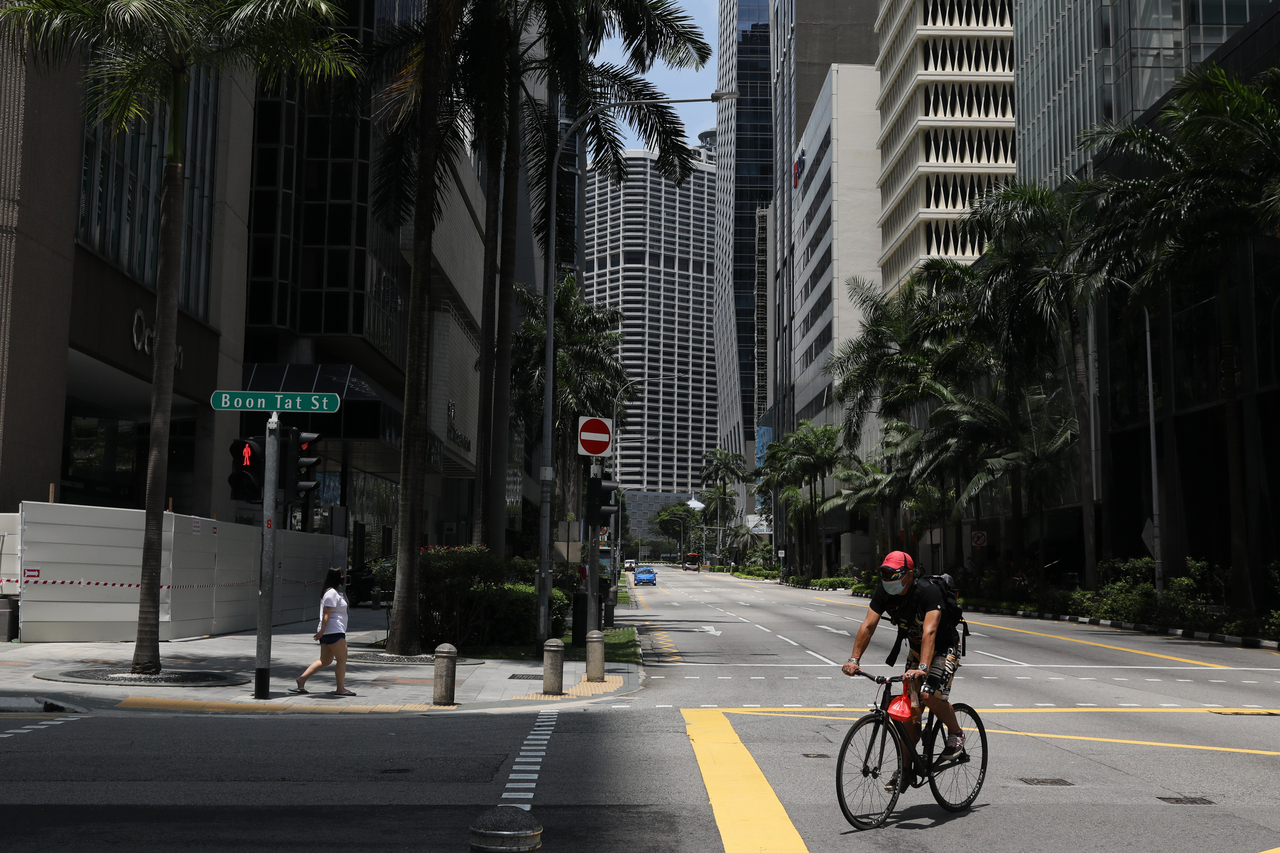Singapore economy may shrink more than 4% this year if coronavirus outbreak drags on: MAS
Sign up now: Get ST's newsletters delivered to your inbox

The Government has said it expects gross domestic product to shrink by between 1 per cent and 4 per cent in 2020.
ST PHOTO: ONG WEE JIN
Follow topic:
SINGAPORE - The many risks to a decisive recovery may see Singapore's economy contract by more than forecast this year, the Monetary Authority of Singapore (MAS) warned in its macroeconomic review released on Tuesday (April 28).
The Government has said it expects gross domestic product (GDP) to shrink by between 1 per cent and 4 per cent in 2020 because of the loss of economic activity at home and abroad amid the travel restrictions and lockdowns imposed to contain the coronavirus pandemic.
This estimate assumes the beginning of a gradual recovery in the second half of the year.
But the near-term economic outlook is fraught with uncertainty, and hinges on how swiftly the pandemic is brought under control globally, Singapore's central bank noted in its latest twice-yearly review.
"There are significant downside risks to Singapore's growth outlook for 2020. The materialisation of any combination of these risks could bring GDP growth below the projected -4 to -1 per cent range," the MAS said.
The risks include a worse-than-expected drop in GDP in the second quarter due to the more stringent containment measures imposed across the world and in Singapore, which are likely to further constrain economic growth, it said.
"Any fallout in global financial markets that further undermines confidence could create negative feedback loops, resulting in knock-on effects on the economy," the MAS said.
The country's top three banks expect Singapore to suffer its worst-ever recession, with forecasts for a GDP contraction ranging from 4 per cent to as much as 10 per cent. Job losses are also likely to be of historic proportion, they said.
The MAS noted that complete containment is harder to achieve compared with the severe acute respiratory syndrome outbreak in 2002, due to the more contagious but less detectable nature of Covid-19.
The uncertainty over prospects of containment may cause consumers and companies to delay spending and keep the global economic recovery more gradual and less decisive.
The MAS said the drop in external demand and trade has darkened the prospects for Singapore's trade-related sector. However, the impact could be uneven across different industries.
"For instance, within the manufacturing sector, highly procyclical industries which are related to oil and electronics will likely be most negatively affected. In comparison, medical-related industries, such as medical technology and pharmaceuticals manufacturing, could experience positive growth," it said.
Singapore last week extended its circuit breaker by about a month to June 1 after a spike in infections at dormitories housing foreign workers lifted the number of Covid-19 cases here to the highest in South-east Asia.
"The abrupt pullback in economic activity due to Covid-19 will weigh heavily on labour demand across broad swathes of the economy," the MAS said. Wages, rather than employment, will bear the brunt of the labour market adjustment in the near term.
The MAS expects job losses to be concentrated in sectors such as the travel-related industries of air transport, accommodation, and arts, entertainment and recreation services, as well as domestic consumer-facing services comprising land transport, retail trade, food services and other personal services.
DBS Bank has projected retrenchments to rise to 45,600 this year, far higher than any of the past recessions, while resident unemployment rate could reach a seasonally adjusted 4.2 per cent, it said.
Most analysts expect foreign workers to account for the bulk of the job losses.

The slack in the labour market and sharply reduced economic activity globally and domestically will exert downward pressure on inflation, the MAS said. The collapse in oil prices will further intensify disinflationary pressures.
The MAS had earlier forecast headline and core inflation to turn negative for the first time since 2002 and average between minus 1 per cent and 0 per cent in 2020.
To prevent a broadening of disinflationary pressures, the MAS said it has set the Singapore dollar exchange rate at an appropriate level.
The MAS uses the Singapore dollar nominal effective exchange rate (S$Neer), a basket of trade-weighted currencies of its major trading partners, to manage the Republic's monetary policy. In its last monetary policy statement on March 30, the MAS re-centred the S$Neer policy band downwards and reduced its rate of appreciation to zero.
The policy easing was further complemented by steps to increase liquidity to the financial system, relax regulatory requirements for banks, and collaborate with the financial industry to ease credit conditions for businesses and households.
The MAS said fiscal policy measures will play the primary role in mitigating the impact of the recession on households, vulnerable individuals and businesses. The Government has announced a string of stimulus packages, taking the total fiscal response to the pandemic to $63.7 billion to help save jobs and firms.
"The measures taken will save jobs, protect livelihoods and help businesses preserve their capacity and capabilities so that the economy can emerge from this severe downturn relatively undamaged," it said.

